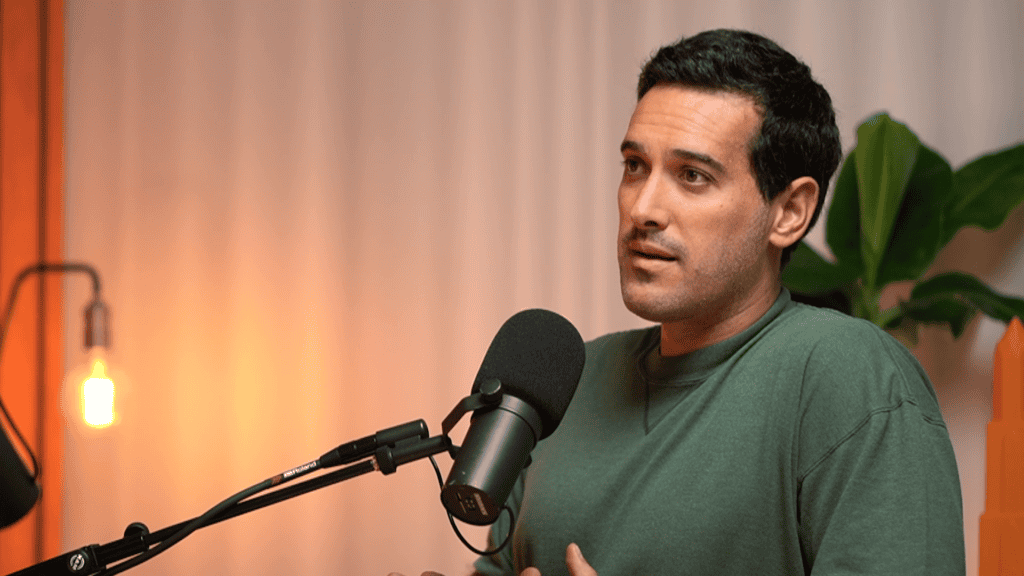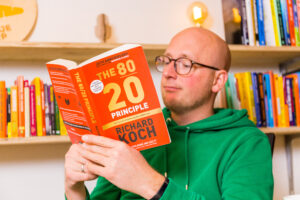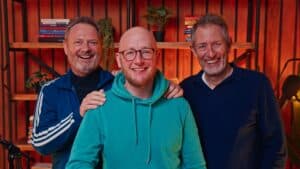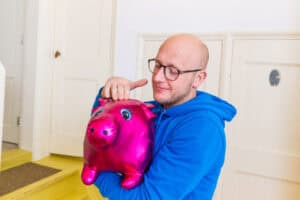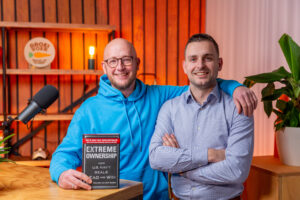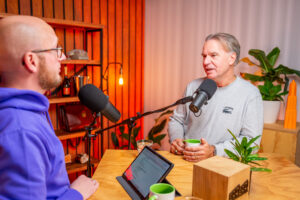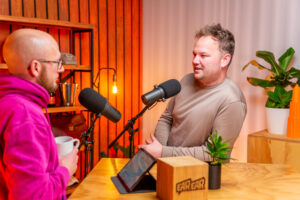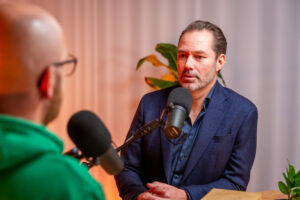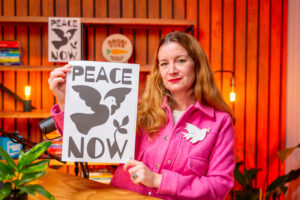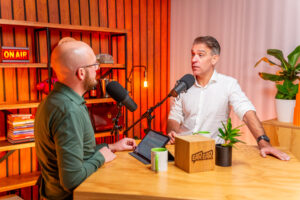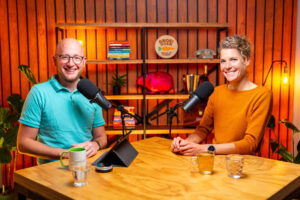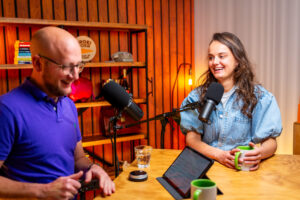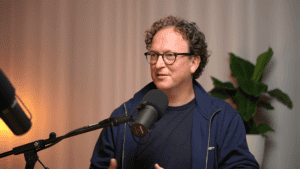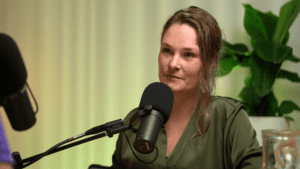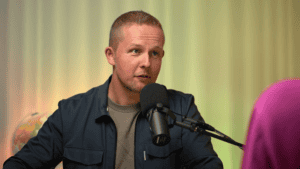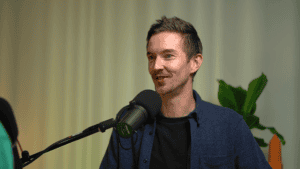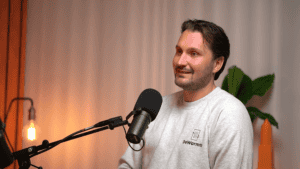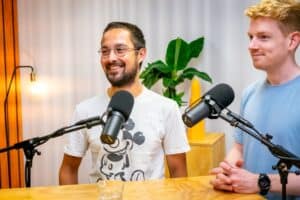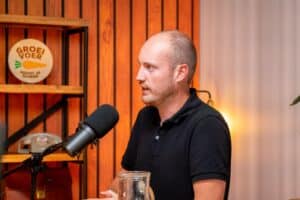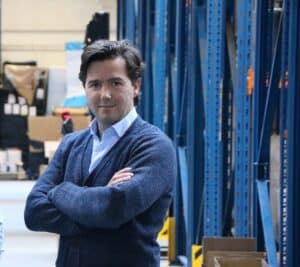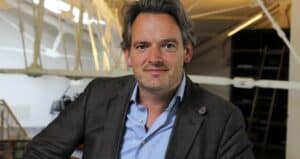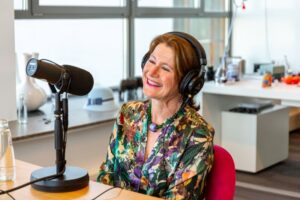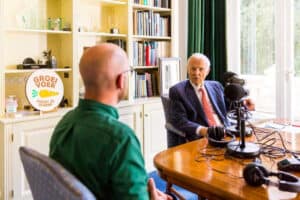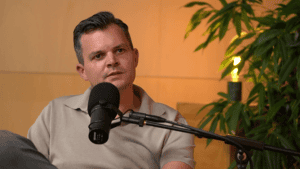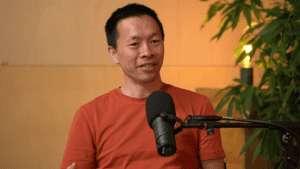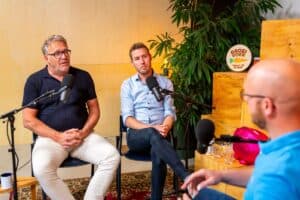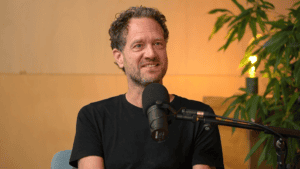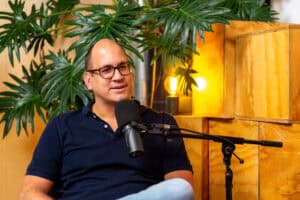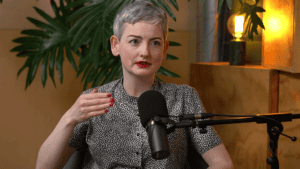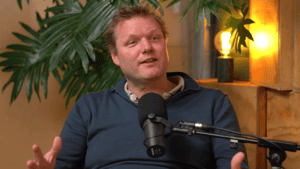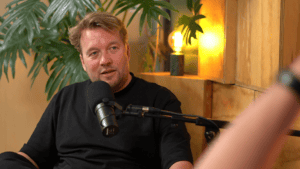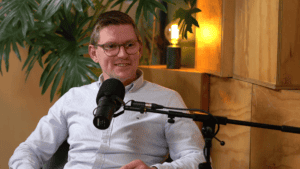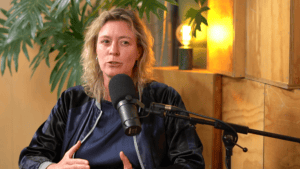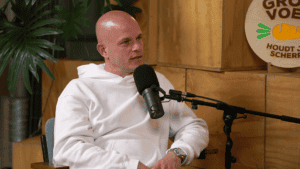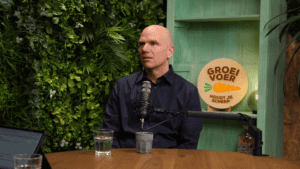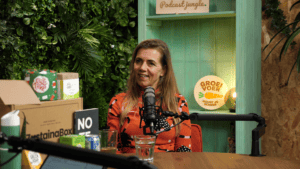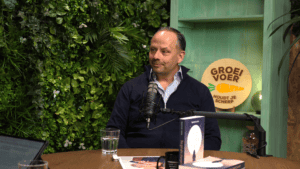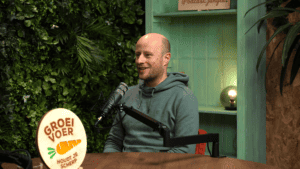Direct luisteren naar deze podcast
Bekijk deze podcast
Introductie van deze gast
Christian Vezjak is founder van TAP, een bedrijf dat talentvolle mensen uit Palestina, Jordanië en Libanon beschikbaar maakt voor bedrijven over de hele wereld.
We staan uiteraard stil bij de situatie in het Midden-Oosten en de impact die dat heeft. Maar we gaan vooral in op de business. Hoe lukte het Christian om in NGO land een startup te bouwen? Welke obstakels kwam hij tegen en welke ondernemerslessen heeft hij geleerd?
Veel plezier met deze nieuwe aflevering!
In deze aflevering
How does TAP work
How does TAP connect to new talent
Why would you use outsourcing methods
Do Dutch entrepreneurs think too small
TAP’s customer base
What is the balance between wealth and social impact
What makes an entrepreneur, a good one
TAP’s future
Christian’s lesson for every single entrepreneur
Shownotes
Relevante links voor deze aflevering
Wil je verbinden met Christian? Voeg hem hier toe op LinkedIn:https://www.linkedin.com/in/christianvezjak/
Link naar de website van TAP: https://www.tapcareers.io/
Zelf een podcast starten? 🎙️
Wil je zelf ook een podcast starten? Gerhard is eigenaar van Ear Ear, een podcast agency die jou kan helpen om een hoogwaardige podcast te maken. Neem contact op met Gerhard. 🚀
Adverteren? 📢
Wil je adverteren bij Groeivoer? Stuur een e-mail naar info@groeivoer.nl en we gaan graag met jou in gesprek.
Volg onze kanalen! 🌐
Op de hoogte blijven van nieuwe afleveringen en events? Volg dan het Whatsapp kanaal van Groeivoer: https://whatsapp.com/channel/0029VaZOSZGHbFV9bpqwwE3B
Of volg ons Telegram kanaal: https://t.me/groeivoer
De beste lessen in jouw mail? 📧
Mail naar info@groeivoer.nl en ontvang een cheat sheet met de 10 beste lessen van 250 groeiondernemers.
Laat een review achter! 🌟
Blij met deze podcast? Laat een review achter op Spotify, Apple Podcast of Google. 👍
Volg ons! 🚀
Voeg Gerhard toe op LinkedIn: https://www.linkedin.com/in/gerhardvelde/
Volg Groeivoer op LinkedIn: https://nl.linkedin.com/company/groeivoer
Volg Groeivoer op Instagram: https://www.instagram.com/groeivoer_podcast/
Volg Groeivoer op TikTok https://www.tiktok.com/@groeivoerpodcast
Volg Groeivoer op X: https://twitter.com/groeivoer
Onze partners 🤝
Deze podcast wordt mede mogelijk gemaakt door Teamleader, het perfecte all-in-one softwarepakket voor het MKB. Probeer Teamleader vandaag nog uit: https://signup.focus.teamleader.eu
Speciale dank gaat uit naar Groenpand, waar de Ear Ear Podcast studio gevestigd is. Check www.groenpand.nl voor meer info over dit mooie bedrijf.
Transcriptie
00:00:00 Christian Vezjak Podcastgast
I got there and I saw these Palestinian cities in the middle of these settlements in, in the middle of this oppression. And then you see these people who are unemployed yet very smart. We’re looking for work. We’re looking to try to use their brains, something productive, a real optimization comes from understanding big problems. We don’t have these problems here anymore. So when you bring people who are from outside the Netherlands.
00:00:20 Christian Vezjak Podcastgast
And they see the problems they have the problems, the opportunity for you to actually build something that solves a bigger problem is much higher. We are completely domain agnostic. So we have sales operations, marketing and obviously everyone learned during COVID that it’s possible to work with people everywhere.
00:00:37
Way for.
00:00:38 Gerhard te Velde Podcasthost
Welcome to Cruise Viewer, a very special episode in English, and my guest today is Christian Varjak. He is the co-founder of TAP.
00:00:48 Gerhard te Velde Podcasthost
Tap matches high potentials from Palestine, Jordan and Lebanon with global startups Christian and welcome to the podcast.
00:00:56 Christian Vezjak Podcastgast
Thank you so much, Gerhart. Pleasure to be here and tell the story.
00:01:01 Gerhard te Velde Podcasthost
Yes, thanks for pronouncing my name. So, so correct and let’s go straight to the founding story of tap and maybe you want to also unpack the name. So what does tap stand for?
00:01:13 Gerhard te Velde Podcasthost
Then let’s see how it was founded.
00:01:17 Christian Vezjak Podcastgast
Right.
00:01:18 Christian Vezjak Podcastgast
So tab stands for talent acceleration platform and it’s really the Co founding story or the founding story that brought us to tap. There’s a lot of iterations in the in the journey, but.
00:01:34 Christian Vezjak Podcastgast
Mainly same same story as you. You’re a founder. You have a problem. And that problem leads to you, to you founding a.
00:01:40 Christian Vezjak Podcastgast
Start up and in the and in the journey you find another problem and then you do something else. So we, uh, I finished an MBA and and one of my my best friend from the NBA and I decided to start a company right after the in the wake of AI we thought we do some some learning on the topic of data and AI we got really intrigued by.
00:02:02 Christian Vezjak Podcastgast
Data and we also are getting tricked by the fact that small businesses don’t have access to data and if they want to have it, they don’t have it accessible. So it’s not easy to use and so on. So how does a shawarma shop actually use data of their customers to improve their products? And so on.
00:02:19 Christian Vezjak Podcastgast
And we build the product we actually, uh, we conceptualise the product, we designed the product, we had the pitch deck, the clients and so on and we needed a development team. And Uhm, we’re looking in in the Netherlands for uh, seven years ago, when I just landed in the Netherlands after the uh, my stint in the NBA and.
00:02:39 Christian Vezjak Podcastgast
Uh, looking for engineers to help us. It was completely unpayable. We just paid for the NBA. We were broke, basically.
00:02:46 Gerhard te Velde Podcasthost
So you had the plan and you wanted to build it. Yeah. And you were looking.
00:02:49 Gerhard te Velde Podcasthost
Or.
00:02:50 Gerhard te Velde Podcasthost
An option or you were comparing quotes to to have to have it built to actually make it OK.
00:02:55 Christian Vezjak Podcastgast
Exactly. And the most convincing one or the best one, was a quote for €35,000 to build an MVP and the MVP.
00:03:04 Gerhard te Velde Podcasthost
Minimum viable products correct? So version one of your actual products.
00:03:09 Christian Vezjak Podcastgast
Correct and has been broke. We had a big fight with my co-founder and almost ended the relationship actually.
00:03:16 Christian Vezjak Podcastgast
And I want to go for it. I’m I’m I’m very bullish. And he was like no, man, you’re crazy. We’re not doing this. And that ended almost the startup. But that made him my co-founder more interested in finding the talent himself. And what he did is he posted on a Facebook group. Hey, I’m looking for software engineers this face Facebook group was actually from the NBA.
00:03:36 Christian Vezjak Podcastgast
And his classmate of ours, who was Palestinian, reached out and said, hey, I’m building a company out of Palestine an IT outsourcing company. I would love for you guys to be my first client.
00:03:46 Christian Vezjak Podcastgast
And and that’s where. That’s what we were actually, we were Jafar’s my my now Co Founders first client after three months, four months of working with Java. We were so so you know, so shocked by the quality and and the the brain power of the guys in Palestine that we actually went to Palestine because he invited Jafar invited me.
00:04:06 Christian Vezjak Podcastgast
Michael founder.
00:04:08 Christian Vezjak Podcastgast
And and for me that was really cool because I’m half Palestinian, half Slovenian, and I wanted to go to see Palestine. So he invited as a Palestine, and me and my co-founder at the time, the, the Swedish.
00:04:19 Christian Vezjak Podcastgast
Guy, what’s his?
00:04:20 Christian Vezjak Podcastgast
Name Eric and he said let’s go and recruit this guy as our CTO. So we had this like little plan.
00:04:28 Christian Vezjak Podcastgast
You go to Palestine, have a nice holiday and then at the end of the holiday.
00:04:31 Christian Vezjak Podcastgast
Hey bro, you.
00:04:32 Christian Vezjak Podcastgast
Need to join us? Here’s the offer.
00:04:32 Gerhard te Velde Podcasthost
Here’s the offer.
00:04:35 Christian Vezjak Podcastgast
And what happened instead is that I got there and I saw, uh you. You see the occupation, you see the settlements and you see these Palestinian cities in the middle of these settlements in, in the middle of this oppression. And then you see these people who are unemployed yet very smart, just like.
00:04:55 Christian Vezjak Podcastgast
Jafar and his team, we’re looking for work. We’re looking to try, you know.
00:05:00 Christian Vezjak Podcastgast
To to to to use their brains. You know for something productive.
00:05:05 Christian Vezjak Podcastgast
And I came back to the Netherlands without the idea, with the idea of recruiting Jafar less. Uh, you know, top of mind and more of helping him out and seeing how could I from the Netherlands, enable this guy Jaffa, who was doing something very, very cool.
00:05:17 Christian Vezjak Podcastgast
Hmm.
00:05:23 Christian Vezjak Podcastgast
Uh, empowering people and yeah, that’s that’s how the whole thing started. Uh and I, I became involved pro bono, just helping out Jafar in his journey.
00:05:34 Gerhard te Velde Podcasthost
Yeah. So where is he?
00:05:35 Christian Vezjak Podcastgast
Now he’s in Nablus in Palestine and I’m based in Amsterdam since five years we worked together. We initially did the IT outsourcing, so we kept the concept, try to make some money and then think about what we what we were going to build and how we were going to empower people.
00:05:52 Christian Vezjak Podcastgast
And when we were more, uh, ready with the concept of how to empower people, we launched tap and we closed the previous company and and with this concept we were able to raise money. We raised almost €1,000,000 as a seed round or precede and and we started our journey to empowering people.
00:06:13 Gerhard te Velde Podcasthost
Yeah. And did you sign Jaffer as a co-founder in the end or?
00:06:19 Gerhard te Velde Podcasthost
Or are you still just? It’s just you and Eric as a founder or.
00:06:23 Christian Vezjak Podcastgast
No, actually, Eric dropped out because it wasn’t his thing. He was all he. He’s also a management consultant. So he was very, very busy and he told me at some point. Hey, man, I I can’t. I can’t go at your speed. Also just because he had some, you know, work issues. So Jeff and I decided to go.
00:06:40 Christian Vezjak Podcastgast
5050 and and build the the company together.
00:06:41 Gerhard te Velde Podcasthost
Uh-huh.
00:06:43
So.
00:06:43 Gerhard te Velde Podcasthost
Right here. And he’s still there or yeah. OK.
00:06:46 Christian Vezjak Podcastgast
Yeah. So from the very get go, we had to build a fully remote company and we understood there was gonna be a challenge, but also it opened a lot of doors. This is pre COVID. So we had to build systems and understand how the whole culture around.
00:07:00 Christian Vezjak Podcastgast
Remote works. How many you know the tools and the and the processes. So then COVID hit and we were already remote and we were already, you know, connecting people to startups. And that became a thing. So we started growing during during COVID.
00:07:18 Gerhard te Velde Podcasthost
Yeah, and only from.
00:07:21 Gerhard te Velde Podcasthost
Palestine areas or also other regions or countries or areas?
00:07:27 Christian Vezjak Podcastgast
Yeah.
00:07:28 Christian Vezjak Podcastgast
Interestingly, we were trying to make the biggest possible impact and that’s when we started looking for who we wanted to empower. So Palestine is obviously a great place to empower people and actually, we started in Gaza, so there was an go called Gaza Sky Geeks and we went to them and said, hey, guys, your graduates who were.
00:07:48 Christian Vezjak Podcastgast
Learning, you know coding and data, how many of them are getting job.
00:07:53 Christian Vezjak Podcastgast
And they said, well, not that many or that was a feeling at least. So we started there, we started helping them out or trying to help them out, trying to understand how to get these guys to the job. So yeah, the whole story of us trying to bridge talent actually started in Gaza.
00:08:11 Christian Vezjak Podcastgast
And UM, and then and then.
00:08:15 Christian Vezjak Podcastgast
And.
00:08:16 Christian Vezjak Podcastgast
Then obviously we wanted to grow and we want to grow to Lebanon and Jordan and so on. So now we are in Lebanon, Jordan and in Palestine, Gaza. It’s no longer possible to operate from Gaza. So. So yeah, we have a bunch of high potentials in Gaza who are not working right now.
00:08:23 Gerhard te Velde Podcasthost
Yeah.
00:08:27
Yeah.
00:08:33 Gerhard te Velde Podcasthost
Yeah. So that’s very of course, very tragic.
00:08:37 Gerhard te Velde Podcasthost
We could unpack that a little more, but I think we all know what’s what’s going on. There’s a lot of sad stories and.
00:08:47 Gerhard te Velde Podcasthost
Is there a way to still be in touch with people there or how how? How are these contacts?
00:08:52 Christian Vezjak Podcastgast
Yeah. No, we are we’re building a big community of people and people are I feel. I feel they feel very supported by the Community. So during the last 12 months, we’ve been helping out as, as however we we can, you know, just by being there for them.
00:09:08 Christian Vezjak Podcastgast
Supporting with you know when they were disconnected from the Internet, you could send them or you can load their SMS their Sims so you can actually connect to the Internet. So we’ve been trying to do everything possible to.
00:09:20 Christian Vezjak Podcastgast
Port, but yeah, you can only you can only do that this much and we knew and we knew from the get go that that.
00:09:26 Gerhard te Velde Podcasthost
Yeah.
00:09:30 Christian Vezjak Podcastgast
You know, if you want to enable people who are chronically underserved, then to learn how to do that, yeah, I guess I was a good starting point that I could really trying to solve the problem in its most difficult shape. And and that led us to build the confidence and I’ll do it, you know, in other places. That’s why we launched Jordan and Lebanon and our.
00:09:44 Gerhard te Velde Podcasthost
Yeah.
00:09:52 Christian Vezjak Podcastgast
Launching other countries.
00:09:54 Gerhard te Velde Podcasthost
Mike.
00:09:54 Christian Vezjak Podcastgast
Like Egypt, for example, Egypt has a tonne of talent.
00:09:56 Gerhard te Velde Podcasthost
Uh-huh. Yeah.
00:10:00 Christian Vezjak Podcastgast
Super, super smart people. Completely untapped. Uh. So you have, you know, 60% of the people in these countries are younger than 26 years old. Of these people, 60 to 70% are educated.
00:10:15 Christian Vezjak Podcastgast
So, and all these educated people, I would argue that 50% or 60%.
00:10:20 Christian Vezjak Podcastgast
Are.
00:10:21 Christian Vezjak Podcastgast
Are unemployed.
00:10:22 Christian Vezjak Podcastgast
Yeah.
00:10:23 Gerhard te Velde Podcasthost
So so how do you transfer that talent or what are the steps to to untap it to to make it into a workforce? Yeah, because there’s lots of practicalities, you know, like how to work together with people in a remote way or how to define if you want to have something programmed, you know, how to define what you want.
00:10:45 Gerhard te Velde Podcasthost
I mean.
00:10:46 Gerhard te Velde Podcasthost
I think there’s a lot of opportunities in the Netherlands. Companies are are looking for programmers, for instance, but what are the practical steps to outsource?
00:10:57 Christian Vezjak Podcastgast
Yeah.
00:10:58 Christian Vezjak Podcastgast
So by the way we, uh, we decided not to be only programmers. We are completely domain agnostic. So we have sales operations. Marketeer marketing could be anything, could be anything we learned from our own experience and obviously everyone learned during COVID that it’s possible to work with people everywhere.
00:11:18 Christian Vezjak Podcastgast
UM and.
00:11:20 Christian Vezjak Podcastgast
But yeah, you have to have some some processes and tools in place.
00:11:25
MHM.
00:11:26 Christian Vezjak Podcastgast
But I think it’s a bit like.
00:11:29 Christian Vezjak Podcastgast
You know, it’s just a it’s. It’s just a matter of.
00:11:34 Christian Vezjak Podcastgast
Just UM generations, right? Ten years ago you would think. Ohh nobody knows anything about, I don’t know web three or now everyone knows what Web 3 is or AI everyone. Now everyone knows what remote work is, so it’s not like I have to teach anybody. It’s it comes with just being person. It’s pretty mainstream.
00:11:52 Gerhard te Velde Podcasthost
It’s mainstream, mainstream already.
00:11:55 Christian Vezjak Podcastgast
So.
00:11:56 Christian Vezjak Podcastgast
And.
00:11:57 Christian Vezjak Podcastgast
So I I I saw a very interesting statistic that 16% of all startups today are fully remote. So I wonder 1616 and growing, right? So I wonder how many of your companies?
00:12:06 Gerhard te Velde Podcasthost
60 or.
00:12:13 Christian Vezjak Podcastgast
Are remote already fully and they accept people from everywhere in the world and and they’re ready for that because that gives you such an edge versus other company.
00:12:23 Christian Vezjak Podcastgast
UM and and I don’t know if this is some what something that is widely known, widely known, but one of the biggest reasons why Bolt is so big versus Uber is because they have a much cheaper stuff.
00:12:33 Christian Vezjak Podcastgast
So they are, you know.
00:12:35 Gerhard te Velde Podcasthost
Voters are taxi service or OK?
00:12:36 Christian Vezjak Podcastgast
The taxi service. Yeah. So companies that are building much cheaper teams have that edge, which is they can compete, they can be 10% cheaper or 5% cheaper. But when we decide on a service, we decide on five percent, 10%, right.
00:12:43 Gerhard te Velde Podcasthost
They can compete, yeah.
00:12:52 Gerhard te Velde Podcasthost
Yeah, but how do you manage it? Because.
00:12:54 Gerhard te Velde Podcasthost
I completely agree with the with the reasoning, but for instance, if I would want someone to edit this podcast so I have an editor in the Netherlands, he has a price tag. Yeah, I could. I actually I did in the in the past, put it on these.
00:13:16 Gerhard te Velde Podcasthost
Platforms, you know, like there’s many gig platforms you you can use.
00:13:20 Gerhard te Velde Podcasthost
Yeah, but then you get reactions. Like. Yeah, someone from Pakistan or India or, I mean, they might be very talented. They might be very trustworthy. But I just don’t know. Yeah. And then you have to put a price tag on it, but it it’s it’s hard, you know, just.
00:13:37 Gerhard te Velde Podcasthost
It takes time to experiment to.
00:13:41 Gerhard te Velde Podcasthost
Develop trust to have to, to come to a work in relation. Yeah. And it’s already hard to work with someone if you’re working every day face to face. You know that can already be an issue with communication and whatever. So what are your insights on that? How how can you make it work? Maybe maybe you have a client where it it works perfectly.
00:14:01 Gerhard te Velde Podcasthost
That could be an example or.
00:14:04 Christian Vezjak Podcastgast
So there’s a few things you can do. So first, the first thing is you need to be, uh, really good at screening. You need to understand what makes somebody, uh, able to work in these kind of environments. And I would argue that the biggest thing that allows somebody to work well is communication, right? So if you, if you have somebody who communicates.
00:14:25 Christian Vezjak Podcastgast
Really, really well written in meetings, setting expectations culturally, then you. This is a really good start.
00:14:32 Christian Vezjak Podcastgast
Point UM, you want somebody who is, uhm, curious, because they have to figure out new ways of working. They have to figure out things that are maybe not set in stone, the queues. Maybe that you might have working together in, in, in an office are not there because it’s all online. But but that’s exactly the work we do actually we screen.
00:14:54 Christian Vezjak Podcastgast
A lot. So we have a 4% or 3% acceptance rate to our programmes.
00:14:59 Gerhard te Velde Podcasthost
Uh, that’s a big difference with the platform because on the platform, everybody can just subscribe and and uh, make an account. But you guys do a lot of screening.
00:15:07 Christian Vezjak Podcastgast
Yes. So actually the platform that we that we use, we have platform that does the job hunting. So basically where people who looking for jobs can actually job hunt and in the back end we’re looking at data of their behaviour, what are they doing and how close are they doing to to be you know to be ready for the job and that’s how we actually pick them we look at.
00:15:27 Christian Vezjak Podcastgast
And you know this behaviour and and this behaviour just tells us very clearly, OK, this guy or woman is ready to go. So we use that plus other screening processes to actually find the people and. And the other thing that’s interesting is.
00:15:42 Christian Vezjak Podcastgast
Is is when you talk about people in Europe or in the Netherlands?
00:15:48 Christian Vezjak Podcastgast
You’re talking about the full spectrum of people, right? You’re saying, OK, I’m gonna look for an engineer. Or maybe I’m looking for a designer and so on. When we talk about people in underserved communities, we’re talking about the top 5% smartest people, because the smarter you are in this part of the world, the more you out.
00:16:06 Christian Vezjak Podcastgast
You outpace the market. Imagine if you are a computer engineer with a PhD. How can you find a job in a place that has no jobs for these kind of people, right? So the smarter you get, the more ambitious you are. The more you you put yourself out of the market and these guys are the ones who see oh, wow, this is opportunity for me to actually join a startup in Berlin doing AI.
00:16:19
Yeah.
00:16:26 Christian Vezjak Podcastgast
This is for me so the self selection process is also very interesting where we get the brightest minds to join our programmes and I mean it’s really cool to see.
00:16:34 Gerhard te Velde Podcasthost
Yeah.
00:16:39 Christian Vezjak Podcastgast
What’s going on? You know you have all these cool startups in in Berlin and Amsterdam and whatever. Just hiring tappers all the time.
00:16:46 Gerhard te Velde Podcasthost
Yeah. Do you think that Dutch people think too small?
00:16:50 Gerhard te Velde Podcasthost
Because I’m thinking about opportunities abroad, like finding golden Nuggets or opportunities abroad, finding people.
00:16:59 Gerhard te Velde Podcasthost
I think that a lot of Dutch entrepreneurs are just focused on the Netherlands and thinking too small. Maybe.
00:17:08 Christian Vezjak Podcastgast
I think Dutch people are very pragmatic and one way to explain pragmatism is is with money, like saving money or wanting to be.
00:17:18 Christian Vezjak Podcastgast
Effective with your money and I think this might be interesting to hear because uh, if you have a team, let’s say your budget is 50K a month to have a team, right, and you want only superstars.
00:17:34 Christian Vezjak Podcastgast
Option A is that you go and obviously you have you and a co-founder maybe they’re both based in the Netherlands. Each one is making 5K, so you have 40K left for the rest of the team. Now you can decide whether you bring, you know, engineers.
00:17:47 Christian Vezjak Podcastgast
And here in the Netherlands are going to cost you 7K on average. So you basically can add another four people or five people to your team. Now if you have 40K and you wanna hire again top people in one of these underserved communities, you can actually bring 20 people to the.
00:18:05 Christian Vezjak Podcastgast
Or you can save a tonne of money that you can use on marketing or sales or whatever else. Right. So I think from that perspective you can run a team that is just so much more efficient financially that gives you runway, gives you opportunity to grow not only that. And I think this is another another point you were alluding to is that.
00:18:16 Gerhard te Velde Podcasthost
Yeah.
00:18:25 Christian Vezjak Podcastgast
The mindset here in the in the Netherlands.
00:18:27 Christian Vezjak Podcastgast
Is.
00:18:28 Christian Vezjak Podcastgast
Is OK, I’m trying to solve a problem I’m trying to solve a huge problem so I can obviously raise money and and tell my story, but we have we don’t have that big of a problem in the Netherlands anymore. Everything is so optimised. What do you do next? OK yeah, an AI startup. Everyone’s trying to go there, but there’s no not nothing else left for entrepreneurs. So a real optimization.
00:18:48 Christian Vezjak Podcastgast
Comes from understanding big problems and we don’t. We don’t have these problems here anymore. So when you bring people who are from outside the Netherlands and they see the problems they have, the problems, the opportunity for you to actually build something that solves a bigger problem is much higher.
00:19:02 Christian Vezjak Podcastgast
And I think that’s happened to us several times. Just the fact that my my origin story where where me and my Co founders said OK, let’s go find some people in Palestine and all of a sudden now I am building a company in Palestine. It’s it’s very telling of what I’m trying to say. Right. So perspectives matter. And if you can bring.
00:19:22 Christian Vezjak Podcastgast
Super smart people with. With these perspectives to your team, then you are gaining value immediately.
00:19:28 Christian Vezjak Podcastgast
And by the way, if you want to understand how to hire remotely, we have all the tools and all the the guidelines on how to do this.
00:19:35 Gerhard te Velde Podcasthost
Yeah, let’s go to a customer. Is there one that stands out for you?
00:19:40
Because.
00:19:40 Christian Vezjak Podcastgast
Yes, yeah, for sure.
00:19:41 Gerhard te Velde Podcasthost
I’m I’m hearing a lot of impacts, but where is the business side of things like making money?
00:19:43 Christian Vezjak Podcastgast
No.
00:19:47 Christian Vezjak Podcastgast
Yeah. So we have about 60 companies who have worked with us already, hiring an average of two people, maybe maybe even 3IN some cases. So we have placed over 150 people.
00:20:01 Christian Vezjak Podcastgast
So far in companies.
00:20:04 Christian Vezjak Podcastgast
I think a really great example, uh. We just recorded a video with them, happy to share it. It’s called deep opinion. Deep opinion is an AI startup in Austria. Funny enough, one of my best friends that works at North Zone, which is a very well known fund in the Netherlands, in Sweden, etcetera. And he was talking to somebody.
00:20:23 Christian Vezjak Podcastgast
From deep opinion in a in a call just by kind of like getting to know each other. Hey, what’s up?
00:20:28 Christian Vezjak Podcastgast
What?
00:20:28 Christian Vezjak Podcastgast
Are you guys building? And then he found out that half of his team was Palestinian in Palestine and he came back to me.
00:20:35 Christian Vezjak Podcastgast
Like.
00:20:35 Christian Vezjak Podcastgast
Bro tappers are working in deep opinion. That’s crazy. Deep opinion is one of the best in their class and I’m like.
00:20:43 Christian Vezjak Podcastgast
I don’t know. It’s starting to happen on on its own, so deep opinion actually hired four people, all of them salespeople. Uh, they. And they’re in charge of the whole sales machine. So the whole sales organisation, they, they are in charge of the data and are in charge of the structuring, the sales processes. Again, these are super bright people, right. So one guy is in charge of.
00:21:03 Christian Vezjak Podcastgast
Of the whole strategy, the other guy is in charge of something else and they they on their own are building this. And I guess in this same way they build an amazing team. They’re saving probably 30K.
00:21:16 Christian Vezjak Podcastgast
Or 25K a month to use it in some other stuff. We have? Uhm, Swiss company hired 2 guys recently. Carvalho, a software engineer and a salesperson. We have another Swiss company that hired a few people. We have a New York based startup who has a CTO here in the Netherlands. They hired 3 people.
00:21:37 Christian Vezjak Podcastgast
And and on and on and on. And I and I just heard that a startup in Riyadh is is hiring four people. Yeah. So it’s it’s it’s really interesting.
00:21:49 Gerhard te Velde Podcasthost
Did you say there is more traction now? Are you getting speed?
00:21:55 Christian Vezjak Podcastgast
Definitely I. Well, the the job market is a bit stuck right now, right? But I always argue that people think about the job, you know, when they are running out of money, they should not be running out of resources, right? So if you say, OK, I’m running out of money, I have to instead of being able to as a founder, to deploy 50K a month, I need to deploy 30K.
00:22:16 Christian Vezjak Podcastgast
Month. So I have a longer runway they think of. OK, now let’s get rid of three people, right? Instead of thinking, OK, let’s get rid of three people and bring 2 or bring bring the.
00:22:28 Christian Vezjak Podcastgast
So I think it’s interesting if you realise that that dynamic is available to actually make your team cheaper right now in this moment that it’s a bit uncertain and keep growing.
00:22:37 Gerhard te Velde Podcasthost
Yeah.
00:22:39 Gerhard te Velde Podcasthost
Yeah. So who would you like to talk to?
00:22:43 Gerhard te Velde Podcasthost
In the in the in Europe maybe. Are there any prospects that come to mind like organisations you would like to work for or is it more like investment groups or the startups or the scale ups? Who would who would be your ideal customer?
00:23:05 Christian Vezjak Podcastgast
Well, we talked to a lot of founders who get intrigued by what we’re by by what we’re doing.
00:23:12 Gerhard te Velde Podcasthost
MHM.
00:23:13 Christian Vezjak Podcastgast
And they and they say, hey, interesting stuff. Uh, I heard about these guys hiring 3 people and they just ask and then and then we explained to them how the whole thing works.
00:23:23 Christian Vezjak Podcastgast
So it’s typically our biggest client right now is venture backed uh seed.
00:23:30 Christian Vezjak Podcastgast
Series A I would say 50% and 50% are actually just starting, so they are the founder and then two more people maybe here and then they bring another 3-4 people from from Jordan and Palestine, Lebanon to to join them in the journey.
00:23:44 Gerhard te Velde Podcasthost
Yeah, but are you aiming for bigger clients or because every startup can can have a a great idea, but if if they don’t have the the budgets, I mean.
00:23:56 Gerhard te Velde Podcasthost
Makes it less interesting, right?
00:23:58 Gerhard te Velde Podcasthost
Yeah.
00:23:59 Christian Vezjak Podcastgast
So, UM, we heard that uh picnic just hired a guy. It was really funny. Uh, but they relocated him to the Netherlands. So that’s an option. You have the money.
00:24:09 Gerhard te Velde Podcasthost
Actually I I think I’m linked to the CEO of Picnic. I’m not sure if he’s behind it, but but that’s a big name in the Netherlands, right? Picnic.
00:24:13 Christian Vezjak Podcastgast
OK.
00:24:21 Christian Vezjak Podcastgast
Yeah, yeah, definitely. And there’s a few other examples of big companies who are starting to look at.
00:24:28 Christian Vezjak Podcastgast
Talent the the only dynamic for these bigger companies is that they have very set policies around hiring so they’re not uh, they’re not prepared to to do these kind of things. So if you want to be prepared to have a fully remote environment then you it’s it’s easier to do it at the beginning of the of the at the inception of the company it’s it’s hard to really change it later.
00:24:47
MHM.
00:24:49 Christian Vezjak Podcastgast
So when we talk to these bigger guys, they tell us.
00:24:52 Christian Vezjak Podcastgast
Super interesting talent, but we want to relocate, relocate them, or uhm yeah, we just can’t do otherwise for us. That’s fine. In the end, it’s UM, it’s as you said, there’s an history. There’s there’s a story of impact because.
00:25:07 Christian Vezjak Podcastgast
People who actually want to hire somebody in an in an underserved community or.
00:25:13 Christian Vezjak Podcastgast
Uh. They also think about the other people, right? They think ohh this is not only about me, this is also about about giving an opportunity to somebody to to be an amazing professional and.
00:25:25 Christian Vezjak Podcastgast
So this is also the kind of people we see coming to us. A lot of people who who have a lot of kind of impact in their mind. So they think about it in this progressive ways.
00:25:36
Yeah.
00:25:37 Gerhard te Velde Podcasthost
How do you balance impact and uh, the commercial side of things?
00:25:42 Christian Vezjak Podcastgast
So I have a bit of a theory that.
00:25:47 Christian Vezjak Podcastgast
If you are a founder today and you’re looking for something to to work on, you want to work on impact. If you see AI, uh, everything indicates that AI will make the world more unlivable and people more you know unequal, so the inequality is the biggest driver for instability.
00:26:07 Christian Vezjak Podcastgast
And when you have instability, you have social problems. Whether that’s, you know, you know, between people or the environment or something.
00:26:16 Christian Vezjak Podcastgast
And I think right now, as founders a really, really interesting opportunity is actually to start in impact in this dynamic of how to balance impact and money or business will will will show itself at some point. What’s interesting is that at the very beginning.
00:26:36 Christian Vezjak Podcastgast
UM, and this might be counterintuitive. There’s more money in impact than there is in VC. Just imagine how much governments in Europe are investing, for example, in, in, in, in now. Yeah. OK.
00:26:49 Gerhard te Velde Podcasthost
C being.
00:26:52 Christian Vezjak Podcastgast
Uh, imagine how many? How many governments are trying to stop uh migration, for example. This is a hot topic, right? How do they stop migration? Do they just, you know, sink all the boats? Or is there something that you they have to do at the origin of the problem?
00:27:08 Gerhard te Velde Podcasthost
No.
00:27:09 Christian Vezjak Podcastgast
So if you were thinking in our shoes, we actually are talking to governments about immigration, right? How to keep the keep the the countries and the cities running because they these guys need talent, they need engineers, they need etcetera. But these these guys can’t come anymore because they want to sink their boats at the same time. So. So how do you do that? So at that when you can pitch this idea to a government and say hey.
00:27:31 Christian Vezjak Podcastgast
For every job that I create for your country, I’m generating 200,000.
00:27:37 Christian Vezjak Podcastgast
Of you know, EUR of value, I want 10%. You can make a lot of money. And that’s the kind of discussions we’re in right now with these, with with different institutions, governments and and so on.
00:27:42 Gerhard te Velde Podcasthost
Hmm.
00:27:48 Gerhard te Velde Podcasthost
So you’re fighting for equality, for instance. Yeah, I think in your case you you do. But how do you balance that with making money?
00:27:57 Christian Vezjak Podcastgast
Well, if if the government is willing to to pay you for job, then then you’re you’re fine. You have to get really creative because sometimes the people you’re trying to serve, they have no money, right? So you have to buy, find this kind of triangle where there’s somebody else who’s willing to pay for them. So you either sometimes turn NGOs to clients.
00:28:18 Christian Vezjak Podcastgast
Or you in another way you can actually.
00:28:22 Christian Vezjak Podcastgast
Delay the the revenues. So for example if I play somebody, if I train somebody for a few months or I help them get the job for a couple of months, they don’t pay me today, they pay me to in, you know, whenever they get the job. Yeah. And that requires a bit of financial engineering and thinking about, you know, different ways.
00:28:40 Christian Vezjak Podcastgast
But again, these these things unlock further opportunities. UM, right now we’re thinking about how can we create a financial system such as UM, you know?
00:28:50 Christian Vezjak Podcastgast
Credit risk.
00:28:54 Christian Vezjak Podcastgast
Infrastructure for people who are completely unbanked, right? Because a lot of the questions that come to us sometimes from from finance, from financiers or VCs or.
00:28:57
M.
00:29:06 Christian Vezjak Podcastgast
Others is how do you how do you know these guys are gonna pay back? Yeah. And then you’re like, well, we know because we’re building the systems to do it right and that from a start up person.
00:29:15 Christian Vezjak Podcastgast
Also gives you much more competitive advantage, right?
00:29:20 Christian Vezjak Podcastgast
So you’re building all these things that are super useful to solve a problem, and then you’re getting you’re getting, uh, you know, you’re you’re figuring out the balance between impact and and in business. It’s an amazing journey because.
00:29:34 Christian Vezjak Podcastgast
The people who are attracted to doing these things with you, they’re all mission driven and then the whole concept of of building a company gets so much more human humanised. You’re not chasing profit, you’re not chasing, you’re not chasing.
00:29:47 Christian Vezjak Podcastgast
You know, maybe in some cases having to create a service that doesn’t really add any value, you know, and and and.
00:29:55 Gerhard te Velde Podcasthost
Like what?
00:29:57 Christian Vezjak Podcastgast
I mean, I mean subscription based uh models, right? Could be anything like, but the gym, I mean I go to the gym once a week or maybe never because I forget, but they’re making money every single day because I’m paying a subscription, right? So these guys are not maximising for you, getting fitter, they’re maximising for them making money and that’s what most businesses are doing today.
00:30:01 Gerhard te Velde Podcasthost
Could be anything else.
00:30:16 Christian Vezjak Podcastgast
And I think this this kind of business more and more will attract less of the cool people you want to be surrounded with.
00:30:23 Gerhard te Velde Podcasthost
Yeah, you went to visit.
00:30:24 Gerhard te Velde Podcasthost
Cool, yes, and sees what? What makes a good entrepreneur?
00:30:29 Christian Vezjak Podcastgast
Who makes an MBA a good entrepreneur?
00:30:31 Gerhard te Velde Podcasthost
What makes a good entrepreneur in general?
00:30:35 Christian Vezjak Podcastgast
I think uh, in my case, uh example. So my father was a good entrepreneur.
00:30:41 Gerhard te Velde Podcasthost
What did you do?
00:30:42 Christian Vezjak Podcastgast
He was he had a company that was selling construction equipment, mining equipment, industrial equipment in Bolivia and I was part of that journey for 10 years where we where he built the company in front of my eyes. I was also heavily involved.
00:30:57 Christian Vezjak Podcastgast
So I think mentorship, the closest you can get to a good entrepreneur, I mean all the good stories of big entrepreneurs is like, Oh yeah, and I was working with and they will name drop.
00:31:06 Gerhard te Velde Podcasthost
Right. And what made your father a good entrepreneur?
00:31:10 Christian Vezjak Podcastgast
I think his circumstances, immigration. He was an immigrant from Yugoslavia or Slovenia who ended up in Bolivia.
00:31:17 Christian Vezjak Podcastgast
And I think this is also the power and of of what we’re doing right. When you are an immigrant, you have to prove yourself in a very tough environment such as our students have to prove themselves in the Berlin AI startup. They just they just got high.
00:31:30 Christian Vezjak Podcastgast
That the dynamics change the the, the, the, the, the, the amount of work, the amount of ambition is triple and if you have the right, you know you know the the the in the right circumstances and and being an immigrant can be really, really powerful for for a for entrepreneurs.
00:31:37
Yeah.
00:31:50 Christian Vezjak Podcastgast
I know of funds that only invest in immigrants.
00:31:53
Hmm.
00:31:55 Gerhard te Velde Podcasthost
And what makes you a good entrepreneur? Because you you watch your father do it.
00:32:00 Gerhard te Velde Podcasthost
And what are some traits that you have that you think are really beneficial to success?
00:32:06 Christian Vezjak Podcastgast
I think.
00:32:09 Christian Vezjak Podcastgast
My father did.
00:32:12 Christian Vezjak Podcastgast
What was right at the time, meaning he was building a pro, a profitable business. That uhm, that if you compare it to today’s tech environment, which is he was not building a tech company would be.
00:32:27 Christian Vezjak Podcastgast
This.
00:32:28 Christian Vezjak Podcastgast
Very profit driven approach. What makes me a better entrepreneur or just what what what I’ve learned and how I have adjusted my in my journey is that I have adjusted for just for the conditions of of of the world. Right. We’re solving world problems and the world needs right now people to be more.
00:32:48 Christian Vezjak Podcastgast
Thoughtful of.
00:32:50 Christian Vezjak Podcastgast
The impact they’re making and when I when I left my dad’s business, I was very determined to sort of impact business.
00:32:59 Christian Vezjak Podcastgast
And you know typically.
00:33:03 Christian Vezjak Podcastgast
One in ten of these journeys would have been successful, right? In my case, I was lucky that my journey the first time was successful.
00:33:13 Christian Vezjak Podcastgast
UM or is at least successful for now, but I wonder if has it. Does it have to do with the fact that I that I do want to to to impact and that made my chances much higher? So yeah, I think it’s, uh, the world is changing and and and we just have to be aware of of how to make sure the changes.
00:33:34 Christian Vezjak Podcastgast
Are not creating very negative effects.
00:33:37 Gerhard te Velde Podcasthost
Yeah. Are there any sources or books or videos you would recommend if people want to be better entrepreneurs?
00:33:46 Gerhard te Velde Podcasthost
Mr Book you wanna would wanna hand out to everybody.
00:33:48 Christian Vezjak Podcastgast
Yeah.
00:33:51 Christian Vezjak Podcastgast
Let me think.
00:33:53 Christian Vezjak Podcastgast
There’s a couple of good books.
00:33:55 Christian Vezjak Podcastgast
I’ve.
00:33:56 Christian Vezjak Podcastgast
I’ve I’ve read, I mean just just looking at your library here. I think I read a few UM.
00:34:05 Christian Vezjak Podcastgast
I think it’s it’s interesting to understand the venture capital world. So for example the what is the name of the the road, the what is it called? It’s a it’s a VC book that explains the workings of the VC world in my world, especially when you don’t understand how the power curve.
00:34:24 Christian Vezjak Podcastgast
Works and and and what VCs are looking at. You’re pitching a startup that has impact, but they’re like bro, this is not, this is not going to. There’s no power.
00:34:34 Christian Vezjak Podcastgast
Here.
00:34:35 Christian Vezjak Podcastgast
So, so that was a bit tough for me until I understood really how the VC World works. So down what’s the name of?
00:34:45 Gerhard te Velde Podcasthost
We’ll put it in the shell as well. We’ll get back to it, but yeah.
00:34:46 Christian Vezjak Podcastgast
Yeah.
00:34:49 Christian Vezjak Podcastgast
Sand Hill, the Sand Hill Rd or something? It’s called.
00:34:52 Gerhard te Velde Podcasthost
But you have to understand the power curve and you have to understand how these these faeces work.
00:35:00 Christian Vezjak Podcastgast
I think the power curve is a concept that is, that is that needs to be understood from the get go because otherwise you’re.
00:35:05 Christian Vezjak Podcastgast
Just pitching to can you explain what it what?
00:35:08 Gerhard te Velde Podcasthost
Means.
00:35:09 Christian Vezjak Podcastgast
It it means that your business needs to be able to scale. Uh in theory 1000 X and has returned 1000 X.
00:35:16 Christian Vezjak Podcastgast
So if you’re trying to, if you’re trying to tell an investor, hey, UMI have a cool business and if you invest you know 100K, there’s a chance you’re gonna get 2 million at some point in return. They’re gonna be like.
00:35:28 Christian Vezjak Podcastgast
What? So what? They don’t. They don’t like that math. They like math. That is because obviously 99% of business are gonna fail. 95 are really, you know, not are not gonna bring all the Super huge returns. You have to be able to pitch the business at 1000 X and if you’re not then you either are not in the right.
00:35:41
Yeah.
00:35:47 Christian Vezjak Podcastgast
Industry or you’re not. Uh, pitching it, pitching the right solution to the problem in that industry, but that takes time. So that’s why we pivot. That’s why we are iterating the whole time and and and that’s why we have to be really good at that as well. I think as a founder and I think that’s what going to your to your point previously about why I.
00:36:07 Christian Vezjak Podcastgast
Think I’m a I’m an OK founder. It’s because I I know how to keep the lights on for as long as possible. So in the background we’re iterating with the team as much as we need to to get to that point where we can scale.
00:36:20 Gerhard te Velde Podcasthost
Now.
00:36:20 Gerhard te Velde Podcasthost
So where is the business going?
00:36:23 Christian Vezjak Podcastgast
So we are through, we’re going through a pivot right now. Actually we we were you introduced me as we’re matching you know people from Palestine to people to tech companies. We’ve learned that matching is very limiting. So you’re trying to you know basically solve the needle in the haystack problem on both ends you know the.
00:36:44 Christian Vezjak Podcastgast
Talent finding the the company, the company finding the.
00:36:46 Christian Vezjak Podcastgast
So we’re focused now fully on empowering the individuals to find.
00:36:50 Christian Vezjak Podcastgast
Jobs.
00:36:51 Christian Vezjak Podcastgast
So that means that we can actually have a much more scalable product that where you basically where we provide you the tools, the systems, the strategies to find yourself a job and we’re not limiting you by telling you we’re going to find your job because when you give the power to the individuals, you don’t know what’s going to happen.
00:37:07 Christian Vezjak Podcastgast
These guys might have so much.
00:37:09 Christian Vezjak Podcastgast
You know, potential that you’re not unlocking because you’re telling them, hey, we’re matching, you know, where is etcetera. So we’re we’re stopping that a bit.
00:37:17 Gerhard te Velde Podcasthost
Interesting.
00:37:19 Gerhard te Velde Podcasthost
I think we’re going to put up a billboard and we can have a message up there for the world and specifically for our entrepreneurs. So is there anything you would like to share with all the entrepreneurs on this planet?
00:37:35 Christian Vezjak Podcastgast
Yeah.
00:37:37 Christian Vezjak Podcastgast
For sure I don’t know the story is is is happened a long time ago, but I think it it exemplifies my idea of of of impact.
00:37:48 Christian Vezjak Podcastgast
And why building something that you really care for right now? If you care about money and that’s what drives you, and fine, do that, right. It’s it’s unlikely because as human beings, we care about fitting, we care about being understood by others, respected by others, and that that comes. We are human, right. So saying ohh we care about.
00:38:04 Gerhard te Velde Podcasthost
We’re human.
00:38:08 Christian Vezjak Podcastgast
Of it, it’s the and human in my in my way of thinking.
00:38:12 Christian Vezjak Podcastgast
But I very coincidentally, I graduated from colleges in the States and the the speaker was Elon Musk, the commencement speaker. This is 20 something. Years ago, he was just just out of selling PayPal and he was there in front of us.
00:38:26 Christian Vezjak Podcastgast
And I was like, my dad was like, who’s this crazy guy? I was like, who’s this crazy guy? And he said.
00:38:32 Christian Vezjak Podcastgast
You can.
00:38:34 Christian Vezjak Podcastgast
Live your life.
00:38:36 Christian Vezjak Podcastgast
In a way that you’re trying to pursue your dreams and failing at pursuing your dreams, and that life looks so much better than the life where you are not pursuing your dreams and you’re failing anyways. Or you being successful, it doesn’t really matter. So to not choose what what is your mission and what drives you, it’s actually already.
00:38:57 Christian Vezjak Podcastgast
From the get go flawed now what drives you again? It could be different.
00:39:00 Christian Vezjak Podcastgast
Things. But what’s interesting right now is that if you look at purpose and impact and this is something that that interests you, there’s a lot of opportunities there. The world is is imploding somehow, right? So that means that there’s a lot of value to be created by making the world.
00:39:16 Christian Vezjak Podcastgast
A really a better place so everyone who’s trying to start a company think about impact. Think about what is not working in society and should be working well and a lot of times.
00:39:28 Christian Vezjak Podcastgast
This is these places are covered by governments and NGOs, so go look at those things, they, they, this, this, this guy, these places have so much potential for innovation and for bright minds to to solve problems.
00:39:39 Gerhard te Velde Podcasthost
Yeah. So what’s going to be on the Billboard?
00:39:42 Gerhard te Velde Podcasthost
Gotta be short.
00:39:43 Christian Vezjak Podcastgast
And billboards. OK, OK. the Billboard is gonna say.
00:39:44 Gerhard te Velde Podcasthost
Gotta be big.
00:39:49 Christian Vezjak Podcastgast
Uh, following your heart and following uhm, the dream of becoming an entrepreneur have never been.
00:39:58 Christian Vezjak Podcastgast
As aligned as they are today.
00:40:02 Gerhard te Velde Podcasthost
And go for impact.
00:40:03 Christian Vezjak Podcastgast
Go for impact.
00:40:04 Gerhard te Velde Podcasthost
Don’t be scared.
00:40:06 Gerhard te Velde Podcasthost
You think the money will follow?
00:40:09 Christian Vezjak Podcastgast
The money will follow and and and if it doesn’t, there is enough energy because of what you’ve done and the people you’ve brought together and so on, that somehow the business will continue. It will continue in a different way, shape or form, but it’s not going to implode. So your legacy is not going to be like, Oh yeah, I tried to build a company for three years and then explode it, right.
00:40:28 Gerhard te Velde Podcasthost
Don’t don’t be scared, because what’s the worst that can happen?
00:40:32 Gerhard te Velde Podcasthost
I mean, I think human beings are also filled with fear, you know, for many things.
00:40:37 Gerhard te Velde Podcasthost
It’s unnecessary.
00:40:39 Christian Vezjak Podcastgast
Yeah.
00:40:41 Gerhard te Velde Podcasthost
Some deep **** right there. OK, I want to close with the tape. So if people are interested, want to know more about you. What’s the easiest place to contact you?
00:40:52 Christian Vezjak Podcastgast
Yeah, they can. They can e-mail me or or find me on LinkedIn. Uh, my e-mail. I’ll share with you.
00:40:59 Gerhard te Velde Podcasthost
Yeah, we’ll put it in show notes, yeah.
00:41:02 Christian Vezjak Podcastgast
They can follow us on LinkedIn if they need to be convinced about what we’re doing. They can follow every single week we post about who hired who and we tell the story of the company. We tell the story of the individual.
00:41:15 Christian Vezjak Podcastgast
UM, so follow us on LinkedIn and UM, if you ever have.
00:41:20 Christian Vezjak Podcastgast
An interest in building an impact company. You don’t know where to start. Ping me. Uh, I’ve had a few really, really interesting chats. Uh, you know, coming from somebody who was just trying to figure out what where?
00:41:33 Gerhard te Velde Podcasthost
To start. Yeah, cool. Thank you, Christian.
00:41:35 Christian Vezjak Podcastgast
Thank you so much.
00:41:36 Gerhard te Velde Podcasthost
Thank you for listening and watching to truvor the beautiful Dutch name. All the information on tap and all the other things we mentioned can be found in the show notes. And if you like this podcast, please leave a review. So more.
00:41:50 Gerhard te Velde Podcasthost
You will discover this beautiful podcast and don’t forget to subscribe on YouTube, of course, and see you next time. Bye.

